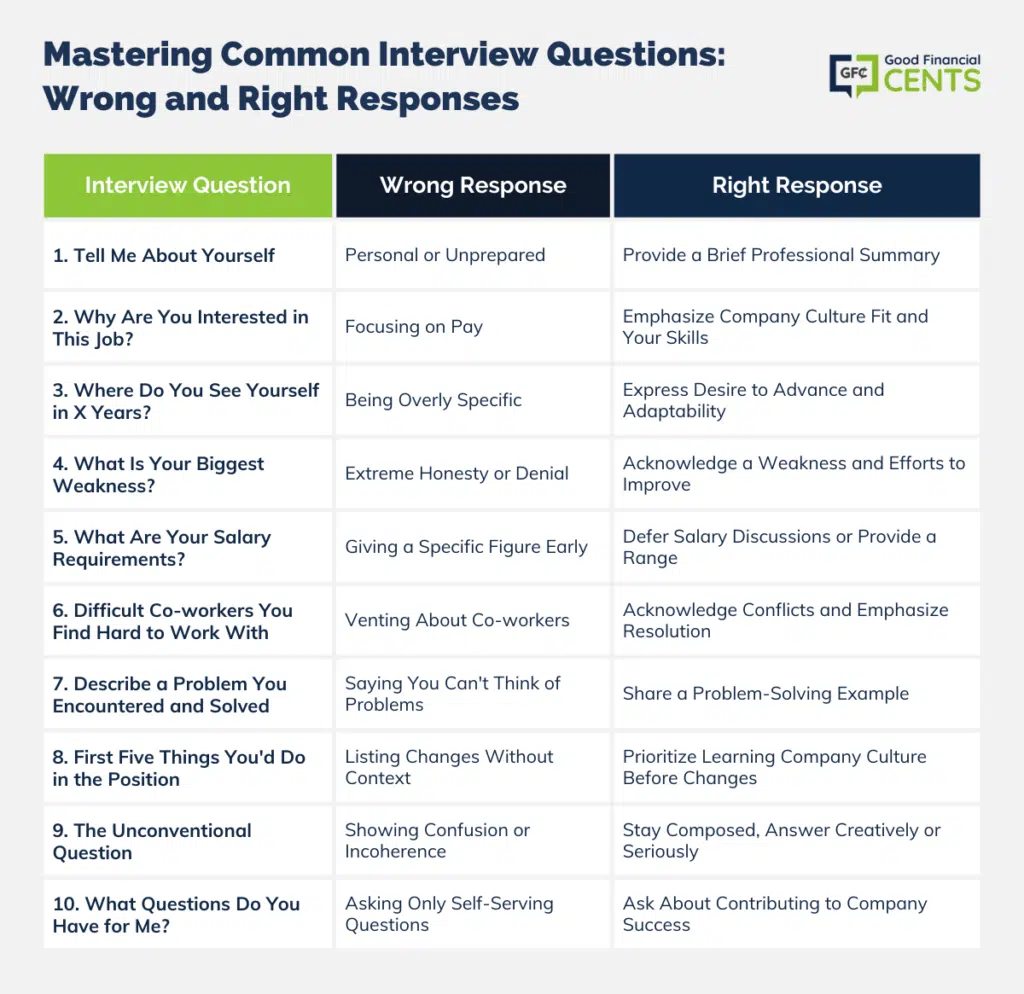Adjusting my tie for the 17th time, I nervously walked into the branch manager’s oversized office.
Decorated by a professional with of one of the largest oak desks I’ve ever seen, it made me feel even more out of my league. The branch manager made A LOT of money and was not afraid to show it.
The job market was scarce, with the Dot-com bubble still having its effect on the economy, and many of my college classmates were having trouble finding a job. This was my first “real” interview.
Sure, I had interviewed at McDonald’s, various mall jobs, and a few office-type positions. But this was my career, and I wanted to be a financial advisor.
Even though I had the backing of one of the top producers in the office, I still had to get the blessing of the branch manager. To do that, I had to give an awesome interview.
No pressure!
Whether you are going on your first or your 400th interview, it is always possible for an interview question to catch you flat-footed.
And since the interview is your prospective employer’s first impression of you, even one poorly thought-out answer can nix any hopes you might have for working for the company.
Find Jobs in Your Area
Here are 10 common interview questions, along with the right and wrong way to answer them:
Table of Contents
- 1. Tell Me About Yourself.
- 2. Why Are You Interested in This Job?
- 3. Where Do You See Yourself in X Years?
- 4. What Is Your Biggest Weakness?
- 5. What Are Your Salary Requirements?
- 6. What kind of co-workers do you find difficult to work with?
- 7. Describe a problem you have encountered and how you solved it.
- 8. What are the first five things you would do if you got this position?
- 9. The Unconventional Question
- 10. What Questions Do You Have for Me?
- Preparing for the Interview
- Bottom Line – Don’t Choke! 10 Interview Questions (With Answers) That Will Help You Land Your Dream Job
1. Tell Me About Yourself.
This is probably the most common of all interview questions, and it seems like a softball.
But if you’re not prepared for this question, you might find yourself boring your interviewer with stories about your family and your ever-growing collection of classic Matchbox cars.
Just as with any interview question, you want to be prepared.
Wrong Response:
If you find yourself stammering through an explanation of how your colon surgery made it impossible for you to work for a couple of years so you are currently an expert on daytime TV, you’ve loused this answer up.
Right Response:
For example, if you’re interviewing for a journalism position and have been a news and politics junkie since you were a kid, you might tell your interviewer that listening to Ross Perot’s hilarious wordplay in the 1992 presidential debates sparked your interest in current events, which led to a bachelor’s degree in journalism followed by X, Y and Z jobs in the field.
2. Why Are You Interested in This Job?
This is a question wherein few interviewers really want an honest answer. Interviews would hardly get off the ground if everyone responded to this question with, “The pay and benefits sound great” or “I’m willing to take any job at this point because I need to put food on the table.”
What this question is really asking is how you would fit into the culture of the organization.
Wrong Response:
Right Response:
For instance, an engineer might tell an automotive manufacturer that she believes in and is knowledgeable about the cars they produce and that working there will help her to achieve her dream of helping Americans reduce their carbon footprint through continually working to improve the efficiency for which the company is known.
3. Where Do You See Yourself in X Years?

Interviewers ask this question in part to see if your goals and expectations for yourself line up with those of the company.
It can be a difficult question to maneuver around, however, because you don’t know your interviewer well.
For example, stating that you would like to get to the point in your career where you are considered for promotions, like the head of a department, might just rub the interviewer (who is the current head of the department) the wrong way.
So, how do you answer this potential landmine?
Wrong Answer:
Right Answer:
One of the best answers to this question I’ve ever seen was posted by L. Bosco on the Work Coach Café blog:
“I don’t have a specific plan! I would like to advance. However, I am flexible. I will do my current job to the best of my ability and keep my eyes open for opportunities within the organization to advance, even if it means changing roles.
I am prepared to learn new things and contribute to the overall success of the organization in a number of ways. The only specific within that “plan of willingness” is that the opportunity is within my ability to learn, interesting enough for me to dig in and do a good job, and the compensation increase a reasonable amount in relation to the demands of the position.”
4. What Is Your Biggest Weakness?
This is one of those interview questions that hardly seems fair. It’s usually a follow-up to What is your greatest strength?
But it is a much more difficult question to answer. Interviewers are hip to the “I’m an overachiever who doesn’t know when to quit” non-answer to this question, so it can be very difficult to know the right way to respond.
Wrong Answer:
Right Answer:
But don’t stop there. Then, go on to talk about what you have done to work on that flaw and use specific examples from your resume to back up your claims that you are working on this issue.
You’ll get points for honesty, and you’ll have turned this difficult question into a review of what you have done and how you have worked through an issue.
5. What Are Your Salary Requirements?

A businessman once told me that the first person to name a number in any negotiation—from haggling over the price of a car to salary negotiations—is the loser.
So this question is definitely a difficult one. But on the other hand, it is important for you and the interviewer to know that you are on the same page financially.
So, how to answer?
Wrong Answer:
In particular, you do not want to disclose how much you are currently making and use that as a benchmark for how much you’d like to make: “I earned $40,000 in my last job, and I’d like to get at least $45,000 to $50,000.”
This is a mistake because you do not yet know what your job requirements will be.
You could either be low-balling your worth, in which case you could land the job but earn less than you could have, or you could be pricing yourself out of their range, even though you might be willing to earn less in order to work for that company.
Right Answer:
To defer, you can tell the interviewer that you would be open to a discussion about fair salary expectations further along in the interview process.
If pressed, go ahead and name a range of figures rather than a specific dollar amount and base that range on research into the salary expectations of your field.
For example, you might say, “I know that programmers can earn between $50,000 and $60,000 per year in this area, and I think a fair and competitive number for both of us could be found in that range.”
6. What kind of co-workers do you find difficult to work with?
This is another question that you almost wonder why is still on the rosters. Interviewers have to know that people can’t be honest in responding. Tiptoeing around this land mine can be tough without preparing ahead of time.
Wrong Answer:
On the other hand, claiming that you’ve never had any work conflicts in your career will get you disbelieving looks.
Right Answer:
For example, you might say that you haven’t ever worked with anyone you’ve found truly difficult, but it’s been your experience that the occasional interpersonal conflict has always been a learning experience.
You might follow up with an example of a minor conflict that you worked through with the other individual. It will allow the interviewer to see that you are a team player who can overcome the inevitable clashes in the workplace.
7. Describe a problem you have encountered and how you solved it.

This is a fairly straightforward question, but it can still be tricky to answer, particularly if you are early in your career.
The interviewer is looking to see that you are able to think critically and develop solutions to problems.
If the answer to your question shows how well-suited you are to the particular job and industry, even better. But coming up with an example can be tough.
Wrong Answer:
Right Answer:
Whether you solved the problem of an unscrupulous landlord who refused to fix a leak in the apartment during your undergraduate days or you solved a production issue in your last company that led to saving thousands of dollars for the organization, your interviewer wants to know that you are capable of taking a problem by the horns.
8. What are the first five things you would do if you got this position?
This is another question that could be potentially hazardous depending on who is interviewing you and how they feel about the position.
Wrong Answer:
However, going in the opposite direction and listing five ways that you will overhaul the department or make huge changes to current practices can also bite you in the butt.
Your interviewer might feel things work just fine or have some specific ideas about what changes are needed that are different from yours.
Right Answer:
You might say you’d like to start by spending time with the X team or Y department to learn what is most needed from your position.
But you don’t want to completely defer the question by stating that you need more information. In addition to giving some ideas of where you will start learning about the processes of the company, you might also want to list two or three places that could potentially use some tweaking based on what you already know of the organization.
A good answer might look like this:
“I’d like to start by getting to know my team and the current infrastructure. I want to have a good sense of what’s working and what can be improved before making any big decisions. I do have some ideas coming into this, however.
For example, from what I’ve read about your company, I know that finding a balance between customer satisfaction and cost-cutting measures has been a consistent issue, so I’d like to look into the possibility…”
From there, you can list some of the ideas you have come up with for solving problems without appearing to step on any toes.
9. The Unconventional Question
Many interviewers will ask a completely off-the-wall question in order to see how you do in a stressful situation. Some examples of these questions include: If you could compare yourself to any inanimate object, what would it be? and If you could be a superhero, what would your superpower be?
Companies are turning to unconventional interview questions because they are much harder for a candidate to prep for and can often give the interviewer a better sense of what a candidate truly is.
Wrong answer: “Wha…?” Though you may feel completely at sea, don’t let your interviewer see your confusion.
Wrong Answer:
Right Answer:
You can even say something along the lines of, “Wow, that question’s a first for me. Hmm…” to buy yourself a little time to think. Then, give an answer that is true to you—whether that means you use light humor or answer the question seriously based on your understanding of the position.
Your interviewer will be impressed that you are able to remain calm and come up with a creative answer.
10. What Questions Do You Have for Me?
This is the classic interview ender, and it has undermined many an otherwise good interview.
Wrong Answer:
For example, if you ask about benefits, vacation time, or potential for raises or advancement, it will make your interviewer think you’re only interested in what the company can offer you.
Right Answer:
In addition to those sorts of questions, asking about specifics of how the company operates and what to expect from the position can indicate that you have done your homework and are truly hoping to make a good impact on the organization.

Preparing for the Interview
Preparing for interviews is about more than just polishing your resume and getting your best suit dry-cleaned. Figuring out ahead of time how you will answer common questions—and then taking the time to practice answering them—will help you to stand out from the crowd and land that job.

Bottom Line – Don’t Choke! 10 Interview Questions (With Answers) That Will Help You Land Your Dream Job
In the wild world of job interviews, that moment when your dreams meet a real opportunity can get pretty nerve-wracking. Each question they throw at you is like a sneak peek into what you can bring to the table and how well you’d vibe with the team.
Thinking back to when I first jumped into the interview game, with all those jitters and a big dose of determination, it’s a story that lots of us can relate to.








I am off to am interview on Friday & this article was just what i was looking for. Thanks for bringing these great questions & answers to the public.
Good article! We just went through a lengthy process to fill a position (six months of interviewing!) and so many people really blew it.
To 1) I’d just emphasize that your example is really important–mixing a bit of personal with the professional. Too many people just verbally walked through their résumé in bullet points when we actually wanted to know a little bit about them as a person.
For 2) and 10), Yes! We wanted to see some indication that interviewees had gone to our website and learned something about our organization. The people who impressed us were the ones who had obviously done so and crafted some questions about specific projects we had done, what might be coming up that they would work on, etc.
For questions like what kind of culture or work environment you prefer, remember that these would be your co-workers and you would be theirs. Answer honestly, because in the end you don’t want to be in a job that you’d be unhappy in and they don’t want a co-worker who would be a bad fit.
Hi Tina, There is no date on this but I hope you did well. I’m doing MORE research this morning as I have an interview this morning. My biggest concern is that the job description is so vague. It’s working for the County School and their website is hard to navigate and I could not find a full job description, but since this is my background I think I can figure that out. This article was helpful.
As a former hiring manager I agree with Jeff’s responses.
I would add, that you should be prepared for technical questions in the field or industry involved.
If you are an accountant, be able to easily answer accounting questions. If you are a programmer, be ready to answer those types questions. Be honest if you don’t know the answer, but explain why!
Good tips! It helps to practice your answers with a friend who can ask you these questions in random order. The more you prepare, the better you will be!
Man, things like this make me glad that I’m in blue colalr work. No resumes, no weird interview questions. It’s just, “can you weld? Do you hammer? Do you have your own tools?” And then “you have the job” or “get out.” Simple! lol.
Hey Jeff. I like your post. The scariest question for me is the first one. I was interviewed before and that is the first question that was asked of me, and I choked. I don’t know then what he wants to know about me. Good there are posts like these to help others get through with job interviews.